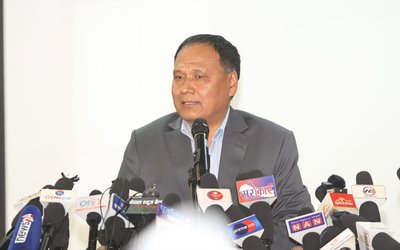
How do you describe the recently concluded review meeting?
We were in the first year. From this year, we are in the process of fully implementing the project. One of the aims of the review meeting was to assess what we did and what we needed to do. We have also made efforts to look at our weaknesses and strengths. We need to sustain the strength and turn the weakness into strength. That was our main agenda.
What lessons did you learn?
What we found is that we are in the right track. Of course, there are some problems in some districts but we are in a position to sort them out. I believe that if there are no problems, something will have gone wrong in implementation. If there are problems, only then we can find their solutions. We move along taking the solution with us. That is the beauty of the project.
How many people participated in the program?
There were altogether 24 people from eight districts. The participants included Local Development Officers, District Technical Officers and Account Officers from each district.
What did you learn for the next year?
There are no problems at all. However, problems with them are that there is budget from several tittles including IDA,DFID, and Nepal Government. There are budgets allocated in all three titles. Our aim is to strengthen the accounting and financial system from the beginning. In the first year, there are still ways to settle the issue.
Is there any confusion?
There is no confusion at all. However, there is certain obligation over RAIDP. In some cases, the road built by RAIDP is not included, so there is a question about what to do with this. However, this is not in DTMP.Our projects are fully guided by commercial, agriculture, population, human development indicators. In some districts, there are certain roads we are unable to finance.
How do you incorporate gender perspective?
One of the important components of our project is gender participation. The aim of our project is maintenance first approach, especially routine maintenance. We have road maintenance guidelines. The guidelines categorically say that maintenance should be done by road maintenance group. There should be two persons in each two kilometers of road. According to this, there will be a group of 20 in 10 kilometer length of road. We are giving high priority for women in the group. Our target is to recruit more and more female workers in the group. According to recent data, our RMG group includes 70 percent female and 30 percent male.
What is the aim of project?
Our aim is to generate employment along with the road maintenance. There are 1082 road workers. Out of them 72.4 percent are female workers. Due to the project, the migration of female workers decline and women feel pride to be a worker as they make 10,000.00 to 11000.00 rupees a month. They also provided occupational health safety. Their payments have been made through the bank. All the female workers have opened bank accounts. They are paid through banks. Banks inform them. Some of the women are drawing money by using ATMs. This is a great change. Women workers are mostly distressed women and oppressed women, Muslims. The children of women are going schools. They have health insurance and education impetus. They have also the feeling that the road belongs to them. There is a growing sense of ownership. They are saying that the road has benefited them. Along with generating employment it has also generated the sense of ownership. This is a very effective project in terms of gender. The beauty of road is to involve female workers. I am very happy to say that we are able to achieve our mission and vision about employee genders.
- IME GROUP: Expands Into Paper Industry
- Mar 24, 2025
- CPN UML: Instigated By India
- Mar 23, 2025
- ADB’S CHIEF ECONOMIST: Nepal Reduces Poverty
- Mar 11, 2025
- FM DR. DEUBA: A Successful Visit
- Mar 11, 2025
- MD GHISING: Target Of Personal Grudge
- Mar 09, 2025















